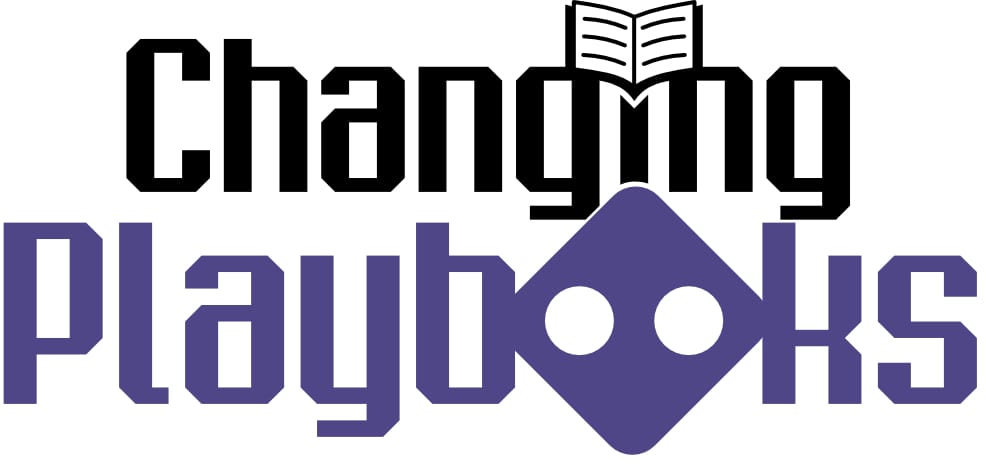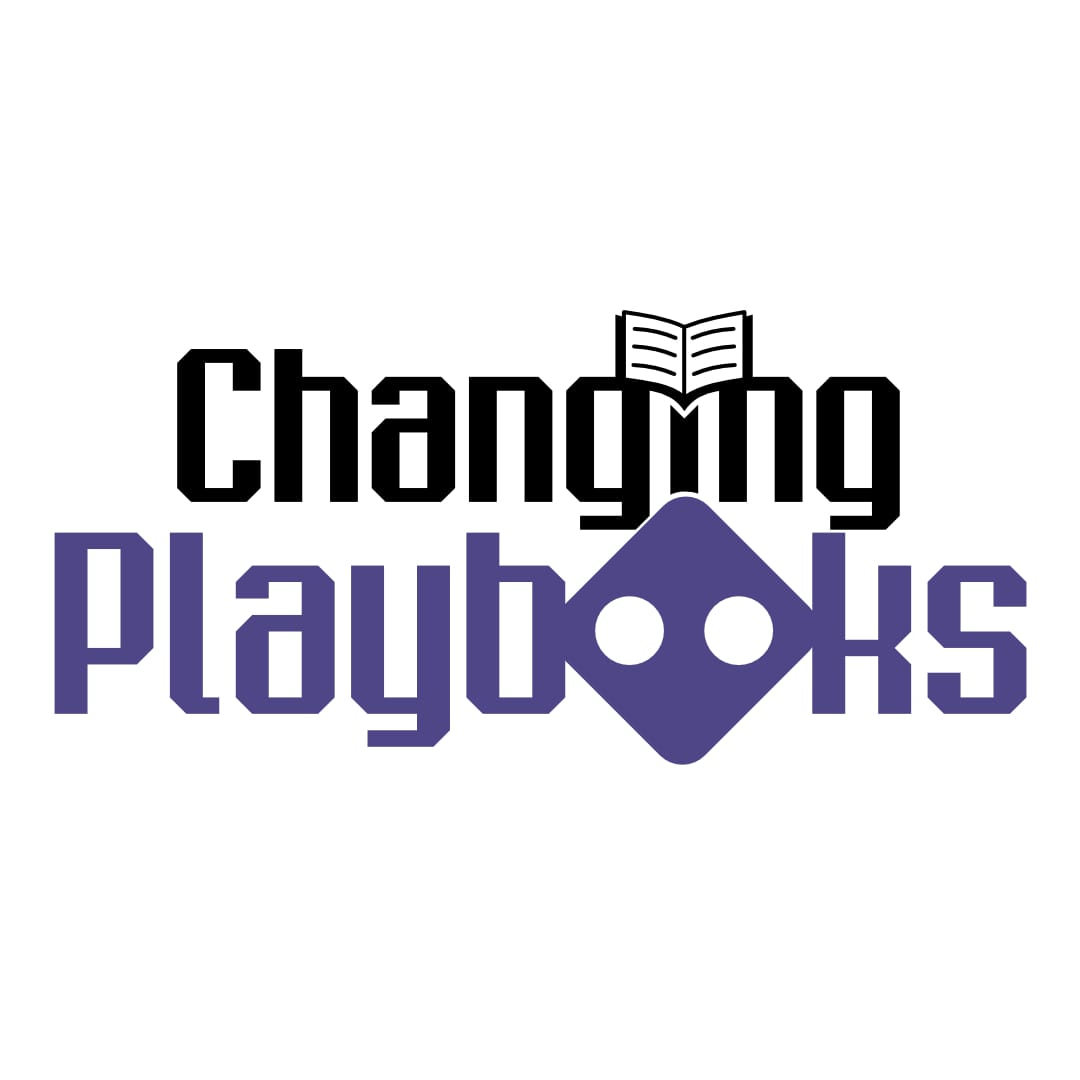Launching Changing Playbooks: How we got here
Playing and running tabletop games has lead me to releasing a whole show about them! There were a lot of steps to get to this point that I wanted to share.

I've been playing tabletop games for more than a decade now and have had a fascination with them for even longer. Last week, on July 30th, 2025, the first episode of Changing Playbooks came out! WOO!
Now, this isn't my first podcast, me and my friend Brianna released our first episode of Salt Cravings in 2018, and that gave me a lot of insight into what it takes, as well as some things to not do. I knew there would need to be preparation, and I'm thankful for that because this took much more time and effort to get everything ready to release. Now that it's out, I thought it would be nice to document not only the decision as to why to release the show in the first place but also a little of what goes into making an episode.
First though, I also wanted to go into a bit about my background with tabletop games, because it really was a bunch of small steps to get to this point.
How'd you get started playing and running tabletop games?
In 2014 I moved to the city I live in now: Vancouver. I was coming in with no real friends or connections and I took the summer before school started to try and get involved with some extracurricular clubs and hobbies. The one connection I did have was an acquaintance I had known from before moving who had moved during the same summer as me. He told me about his roommate, and how he thought we would get along really well.
Why? Well, because we were both queer, duh. Sigh.
Annoyingly, my acquaintance was right, his roommate and I did end up getting along, but it wasn't because we were both queer (though that didn't hurt) but rather because he had a strong interest in tabletop games - something I had always wanted to try but had never gotten the chance to. I played in his games as well as the games of another friend from that group for a few years before I became too busy with school and had to drop out. During that time, however, I played many games, including D&D 3.5E, Fiasco, Savage Worlds, Fate, and definitely more that I've since forgotten.
Flash forward to 2019 and my friend Brianna (the one I started a podcast with) started running her own game, and I was invited to play. We used the system Blades in the Dark (BitD) and it was a blast! BitD was a game about playing as characters in an underworld, running jobs, schemes, and heists. It had been published for only about 2 years at the time, but was gaining popularity fast, creating a whole genre of games inspired by it called Forged in the Dark (FitD) games.
In February 2020 I decided to try my hand at running my own campaign instead of playing in one... I know, great timing. Sigh.
I had chosen a FitD game called Scum & Villainy (S&V), a space opera, that was distinct from BitD but similar enough that I wasn't coming in with zero experience. I even had a former Game Master (GM) of a game I was in as a player who was very supportive of new people trying their hand at running games - which was a huge boon. Still that was how I started running games, and there was so much more to learn.
How do you run your games and what do you think about when doing so?
Brianna played in my game and I played in hers. Both Brianna's campaign of BitD and my campaign of S&V were our first large campaigns we ran, and we both learned a lot by being both GMs and players simultaneously in these games. Most importantly, something I learned is there is no wrong way to GM a game as long as everyone is having fun. How did I learn this? Well, I became a bit of a rules lawyer for a bit and it usually tanked the momentum and enjoyment of games - whoops!
Nowadays I'm quite a bit more lax, though I love when my players are familiar enough with the rules that they can catch me on things I miss. However, the core axiom of my style of play is "do what is fun, even if it breaks the rules." To me, that's the beauty of tabletop games. They aren't video games. You aren't restricted to what you can and can't do by the bounds of the programming. That bendable nature of the medium is what makes it uniquely enjoyable to me.
In my S&V campaign, I made a 151 page GM document. If you're thinking wow that is too long you'd be right! The most important part of that document was the session summaries which spanned only 30 of those pages, which is short when you consider that this was a campaign that ran for 20 4-hour sessions. During the sessions, I would type notes while also running the game, which would split my attention in ways that made me miss important details or lead to misunderstandings. I wasn't a huge fan.
Years later, in 2023, after running a few more games and playing in even more, I decided to return to that universe, and run a proper sequel campaign using Armour Astir. This time however, we were online from the start because my friend Rally, who isn't local, was part of that campaign. Because of that, I decided that instead of taking written notes, I'd record the sessions - and I did exactly that. Recording the sessions proved a huge success for how I run games because it meant I could focus entirely on the moment and the players and re-listen to the previous sessions to remind myself of what happened and even pick up on small details both my players and me (as small throwaway lines) said that I may have otherwise missed.
Recording the sessions had another side effect, however. Instead of writing summaries for the sessions, I edited the sessions into last time on clips to share with my players. This was a lot of fun but very hard! I would use music from my favourite tabletop podcast Friends at the Table, by Jack de Quidt as a backing to the tracks to add extra flavour - since they'll never be published, I wasn't concerned about copyright. But this meant getting a 4-hour session down to either 2 or 3 minutes of detail. This was an exercise in figuring out what parts were most important for my players to remember for whatever prep I had planned.
Why did you decide to start a tabletop show?
The players of my Armour Astir campaign seemed to really like the audio summaries I made. So much so that at one point Rally told me how she thought it'd make a great show if it was ever published. At the time I laughed off the idea of publishing a campaign I ran. After all, I had only been running games for 4 years.
But when that sequel campaign ended at the start of 2024, Rally's comment kept echoing in my mind. It wasn't the first time I'd released a tabletop game, the 50th episode of Salt Cravings was a one-shot, and I'd liked the idea in theory of running a tabletop game show. But if you've ever played in a tabletop game you might now how personal the stories and characters can feel - we can't help but pour a little bit of ourselves into our stories, and letting others listen to that can feel really vulnerable.
In May 2024 I was on vacation in a cabin with some friends, two of whom were Lou and Justin, and I had been floating the idea of starting a tabletop show with people I knew to see who would be interested. I also came up with a list of names for the show, the first of which was "Changing Playbooks" – sometimes the first idea is what sticks. The idea behind the name was that a lot of indie tabletop games use the word "playbook" instead of "class" to signal archetypes and one of my favourite things to represent a character's narrative growth is when you change playbooks part-way through a campaign. Also, I just think it's catchy.
After a few more weeks of conversations, Rally and Lou were on board and Cam - who had listened to my audio summaries and had expressed interest in playing in a game if I ever ran another one - joined too. Justin, in my opinion, is an amazing tabletop player but perhaps and even better musician, and he offered to help with music for the show. In June 2024 we tried out a couple one-shots to check that the table dynamics were good, and gosh were they ever good!
Thus began the production of the first season of Changing Playbooks!
What goes into the technical side of recording and publishing?
Perhaps a bit dry, but I also wanted to share how things work behind the scenes! Over the last year of recording the show, there have been some tech changes and some things that have stayed the same.
At the start of the show Rally and I used a Blue Yeti microphone, an excellent entry-level mic that I used since first getting it in 2017. I also use a cheap shock mount, pop screen, and mic arm - each under $20 and with not real brand name attached to them.
Partway through the show I switched to a Shure SM7B with a Scarlet 2i2 4th edition audio interface. Rally switched to an AKG P220 and got a mic arm. Cam uses a Zingyou BM-800. Lou uses a Studio Projects LSM with a Scarlet 2i2 3rd edition audio interface.
For recording and editing I use Reaper. The others use a mix of Reaper and Audacity. At the end of each session I get everyone to send me their files through wormhole.app, and I use Proton Drive to store everything on a cloud server so everyone has access if they want.
I built a simple website using Craft CMS in order to have a place to put the RSS feed - perhaps the most technically challenging part to this. If anyone who hasn't built a site before was looking to do something like this, I'd suggest using a service like libsyn to host an RSS feed, but my professional background is as a web developer so I thought why not. There are a lot of things that a 2.0 RSS feed can do, and many I didn't do the first time I set one up, so I read the documentation at Podcasting 2.0's website when creating it, which I would highly recommend.
I spent a lot of time on the website's CI/CD pipeline - that is, I can get the website to update automatically without doing a whole lot while still being able to test everything out before it goes live. I set up Github Actions so that whenever I merge a Git branch into the main branch it publishes to the website, and I use a staging branch and a staging site for any large changes to the database just to make sure whatever I do doesn't crash the site. I follow the Gitflow Workflow which I used when working in industry, but recommend even to solo developers, just for organization and ease of referencing what you did months or even years ago.
From there, it's a matter of putting up something (literally anything) into the RSS feed so that it's not empty and using an Apple and Spotify account to register that feed - which can take up to a week, so it's best to do this before the actual first episode goes up. Right after the first episode goes up, whatever was used to start the feed can be removed. Other podcast services often get their information propagated to them by Apple or Spotify as long as the RSS feed isn't locked, so there isn't much more to do there.
With all of that set up, now all I need to do it upload to the site and let everything happen automatically! Currently, there's a backlog of episodes that will be coming out, but that may not always be true, so things may yet change again. Thankfully this is a show about embracing change!
What is the goal with Changing Playbooks?
For me, this has always been and will continue to be, a way to have fun with my friends. I often get excited about the games I'm in, whether I run them or not, and telling people about them secondhand just isn't the same as being there. To me, this is a way to invite people to the table so they can understand why I'm emotionally devastated from a fictional character's death or elated when a romance plot line blossoms.
I'd like to keep going beyond this first season and currently have plans to do so. I'd also like to do one-shot episodes where we can feature more games and indie creators.
Ideally, I'd like enough financial support for the show to cover the cost of the website and to pay the people who make music and art for the show, but beyond that, to me, it's a hobby. One of my favourite hobbies admittedly. I think that love of running and playing tabletop games shines through in the show. A lastly, I hope that people listening can tell how much fun we are having and can get just as excited and invested in our worlds as we do!
Changing Playbooks is an actual-play show about making and embracing change through characters and worlds. Each player has come with varying levels of tabletop game experience in both playing and running games. Most importantly, this is to have fun, spend time together, tell stories, and get a bit too attached to the characters we create.
Our players include Clair Ross (@ClairSkiesAhead), Rally Darling (@RallyOnTheMoon), Camellia Sinestris (@CamelliaSinestris), and Lou (Lou).
Music for the first season is by Justin Murray and is available on Bandcamp now.


